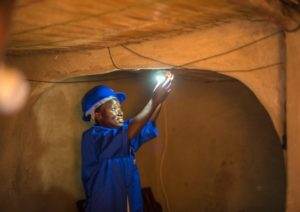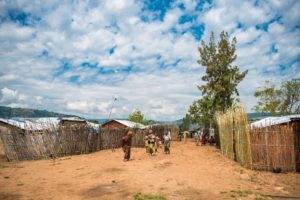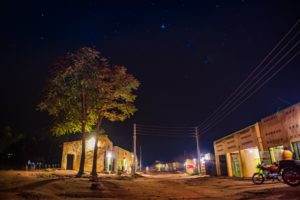We’re supporting refugees to access sustainable energy so they can break their reliance on aid and rebuild their lives. It is work that’s bringing light and hope to the world’s poorest communities.
In this post, we find out more about our work in Rwanda’s refugee camps through a Q&A session with three of the Practical Action field officers who work there.
About the project

Electric lights, powered by the sun, are lighting up homes and businesses in Rwanda’s refugee camps.
Working in partnership with UNHCR and supported by the IKEA Foundation, our Renewable Energy for Refugees project is working with both refugees and their host communities. We’re helping them access finance, training, technology and expertise, as well as renewable energy. It’s powering homes, schools, health clinics and businesses, enabling refugees to flourish and move from reliance on aid to economic independence.
About the field officers
Muhire, Berthille and Theogene are Practical Action staff based in Rwanda. They help facilitate our work with 50,000 refugees in the Kigeme, Nyabiheke, and Gihembe refugee camps. We caught up with Muhire, Berthille and Theogene to get an insight into life in the camps and how our work is helping refugees look forward to a brighter future.
What is your role with Practical Action?
Muhire: There are three main elements to my role. One is to co-ordinate and strengthen the partnerships between Practical Action, UNHCR, MINEMA (the Rwandan Government’s Ministry in Charge of Emergency Management) and other partners and government institutions.
The second part of my role is to help organise the activities of the different suppliers and contractors we work with to make our work happen. Finally, I act as a liaison between Practical Action’s Rwanda office and the refugee camp management to keep the lines of communication open and make sure things run smoothly.

Life in the camps is challenging enough in daylight. Darkness brings fresh challenges.
What is life in the camp like?
Berthille: In some ways, life in the camp is similar to everyday life for Rwandan nationals. Refugees have the opportunity to study, to work, and also to run their own businesses in the camp and in the host community.
What’s different is the living conditions. Refugees face many challenges in their everyday life. They don’t own land, so they can’t grow food. It’s very hard for them to find firewood to cook with because those resources are so limited. And although there is the possibility for them to get a job or run a business, in reality these things are very difficult for them to do because the job market in Rwanda is already very competitive.
There are refugees who are young and enterprising who manage to find a job in the host community. But imagine life for older people, women who have been widowed during the conflict, and disabled people. For a large number of people, every day brings many challenges.
Tell me about one of the ways that Practical Action’s work is helping refugees.
Theogene: When we started working in the camp, we conducted a comprehensive assessment on the usage and access of energy in the camp. It was clear that refugees needed electricity to be able to move forward. Even so, agencies would invest in other areas (such as sanitation), despite our assessment showing that energy was an equally essential thing for their lives.
Without electricity, everyday things we take for granted become difficult, impossible or extremely expensive. For people to have light in their houses after dark, they would have to use candles, which are costly. Even using just two candles a day, every day, ends up costing a lot by the end of the month. That’s just lighting – when you factor in the cost of charging battery-operated things like torches and phones – it adds up to a large expenditure on energy that refugees struggle to afford.
Now, families are able to light their homes using electricity generated by solar panels. I talk to refugees who tell me that save a lot of money through not having to buy candles and pay to charge their devices. They use the money to buy essentials – household products like soap. Also, children can study until later in the evening, because they have a bright, safe light to read and write by. I spoke to a mother recently who told me that her daughter’s school grades have gone up from 40% to 60% since she was able to study in the evenings.

We work with refugees to make sure every streetlight is located to provide maximum benefit.
Why do we use solar energy instead of other types of energy?
Muhire: There are two very important and simple reasons why solar energy is such an effective solution in the camp. Firstly, our solar home system is very affordable for the customers, most of whom are on very low incomes. Solar energy is also clean and healthy – unlike the light and heat produced by firewood, candles or kerosene. And the sun is a renewable source that won’t run out anytime soon!
How do we make sure our work is sustainable?
Theogene: This is important because, in the past, I’ve seen occasions when agencies have brought solutions into the camp but as soon as they have left their activities have stopped.
To avoid this happening, we use use a ‘market-based approach’, which gets refugees involved so that they’re contributing to the solution and are invested in it financially. For example, refugees who get the solar home system part-pay for it over a period of months. That makes them really engaged and ensure that the intervention will be sustainable.
As for the streetlights, refugees work with us to help map where we will put up the streetlights, which means that they really understand the reason for each light being there. And they are the ones who, with our training, make sure that the streetlights are protected from vandalism and theft.
Is there a particular person’s story that’s touched you?
Berthille: I visited an old woman who had just had lighting installed in her home. She told me about something that happened before she has the solar lighting installed. She was looking after her grandchildren and had taken her eyes off them for a moment while she was cooking. She looked back to see the curtains in fire. She told me: “At that moment I was scared to death”. Luckily, she was able to call her neighbours, who helped her put the fire out.
But now is the interesting part, because this woman has told me that this project has saved her life. She says: “Now I’m able to press on the wall and have electricity, so my grandkids don’t have to use candles or a burning stick to have lighting in the house.” Hearing that story does make me feel like my job is very valuable and that this project is contributing a lot.
If you’ve enjoyed this little first-hand insight into our work, seen through the eyes of our staff working in Rwanda, drop us a line by email or on social media to let us know. We’re hoping to bring you more updates from Muhire, Berthille and Theogene soon.